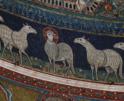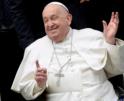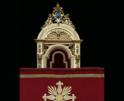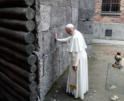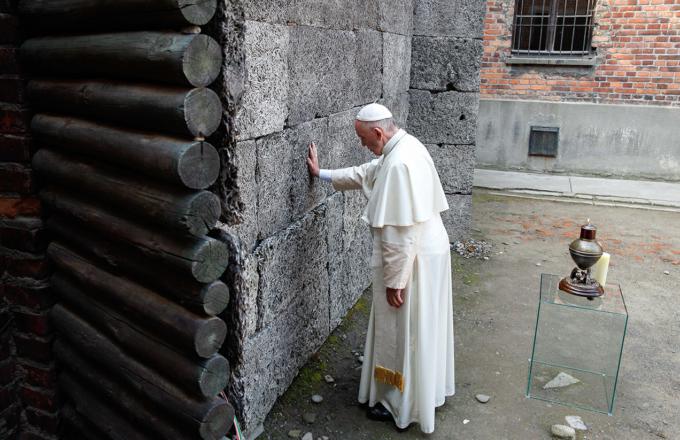
Culture
More than any pope in the Roman Catholic Church's two-millennia-long history, he embraced the Jewish people as equals and condemned antisemitism categorically and unambiguously, not as a political talking point but as a core feature of his theological persona.
Pope Francis was, without question, the most important and most influential religious and theological figure of the 21st century, not just for Roman Catholics, not just for Christians, but for Jews as well.
He was the human face of true faith in and commitment to the human and humanitarian values of nonsectarian monotheism writ large, and he embodied a compassion and empathy that reached far beyond his flock to encompass humankind as a whole.
More than any pope in the Roman Catholic Church's two-millennia-long history, he embraced the Jewish people as equals and condemned antisemitism categorically and unambiguously, not as a political talking point but as a core feature of his theological persona.
"As I have often repeated," he told a visiting delegation of the World Congress of Mountain Jews in 2018, "a Christian cannot be an antisemite; we share the same roots. It would be a contradiction of faith and life. Rather, we are called to commit ourselves to ensure anti-Semitism is banned from the human community."
"The attempt to replace the God of goodness with the idolatry of power and the ideology of hatred ended in the folly of exterminating human beings," he said on the same occasion, referring to the Holocaust. "Consequently, religious freedom is a supreme good to be safeguarded, a fundamental human right and a bulwark against the claims of totalitarianism."
On the first anniversary of the pogrom perpetrated by Hamas on Oct. 7, 2023, he called for a global day of prayer and fasting. "In this dramatic hour of our history," Pope Francis declared at a Mass in the Vatican's St. Peter's Square, "while the winds of war and the fires of violence continue to devastate entire peoples and nations," the Christian community is reminded of its call to "put itself at the service of humanity."
Francis also reached out publicly to non-believers. In a letter to Eugenio Scalfari, the atheist founder of the Italian newspaper La Repubblica, the pope wrote that God's forgiveness was not reserved exclusively for those who believe in Christ. "Given the premise, and this is fundamental, that the mercy of God is limitless for those who turn to him with a sincere and contrite heart," Pope Francis emphasized, "the issue for the unbeliever lies in obeying his or her conscience. There is sin, even for those who have no faith, when conscience is not followed. Listening to and obeying conscience means deciding in the face of what is understood to be good or evil. It is on the basis of this choice that the goodness or evil of our actions is determined."
Pope Francis' sensitivity toward Judaism and the Jewish community was similarly unprecedented. He counted numerous Argentine Jews, including my former colleague Claudio Epelman, the executive director of the Latin American Jewish Congress, among his close personal friends, and he made his respect and genuine affection for the Jewish people a key building block if not a cornerstone of his papacy.
"You also asked me," he wrote in the same letter to Scalfari, "what should be said to the Jewish brethren concerning the promise that God made to them: is that an empty promise? This question, believe me, is a radical one for us Christians because with the help of God, especially in the light of the Second Vatican Council, we have rediscovered that the Jewish people remain for us the holy root from which Jesus was born.
"I too have cultivated many friendships through the years with my Jewish brothers in Argentina and often while in prayer, as my mind turned to the terrible experience of the Shoah, I looked to God," he wrote. "What I can tell you, with St. Paul, is that God has never neglected his faithfulness to the covenant with Israel, and that, through the awful trials of these last centuries, the Jews have preserved their faith in God. And for this, we, the Church and the whole human family, can never be sufficiently grateful to them. Moreover, persevering with faith in the God of the Covenant, they remind everyone, including us Christians, that we wait unceasingly as pilgrims for the return of the Lord, and that therefore we should be open to him and not remain entrenched in our achievements."
The passing of Pope Francis is deeply personal for me. On the Shabbat between Rosh Hashanah and Yom Kippur in 2013, I delivered a guest sermon at Park Avenue Synagogue in Manhattan in which I discussed my personal search for God in the horrors of the Shoah. Specifically, I concluded that contrary to that day's Torah reading, which speaks about God hiding His countenance from the Israelites during the moments of their greatest distress, God was in fact present during the Holocaust within all those who, even at Auschwitz and Treblinka, sought to save the lives of their fellow prisoners, or to alleviate their suffering.
And the Shekhina, the mystical divine manifestation of God, was within my mother and a group of other women inmates as they kept 149 Jewish children alive at Bergen-Belsen during the bitter winter of 1945 until that Nazi concentration camp's liberation.
I took the liberty of sending a copy of that sermon to the pope. Most unexpectedly, I received a moving response from Pope Francis in which he wrote: "When you, with humility, are telling us where God was in that moment, I felt within me that you had transcended all possible explanations and that, after a long pilgrimage -- sometimes sad, tedious or dull -- you came to discover a certain logic and it is from there that you were speaking to us; the logic of First Kings 19:12, the logic of that 'gentle breeze' (I know that it is a very poor translation of the rich Hebrew expression) that constitutes the only possible hermeneutic interpretation. Thank you from my heart. And, please, do not forget to pray for me. May the Lord bless you."
The very fact that Pope Francis reached out to me, the son of two survivors of Auschwitz and Bergen-Belsen, to express his empathetic understanding of my attempt to reconcile the existence of God with the nightmarish realities of the Holocaust is remarkable. His Biblical citation to First Kings is even more so.
He referred to the prophet Elijah's encounter with God in which Elijah is told that God was not in a mountain-shattering wind, nor in an earthquake, nor in a fire, but only in a still small sound or voice, which Pope Francis beautifully and poetically translated as "a gentle breeze."
Viewing the Shoah through a decidedly Jewish theological prism, Pope Francis effectively affirmed that God was not in the horrors, in the gas chambers and crematoria, and that He did not cause the mass murder of millions. Nor did God reside within the perpetrators of the Holocaust or other genocides, whether in Bosnia, Rwanda, Darfur or elsewhere. Rather, the divine presence can only be found in the unfathomable inner strength of those who do not allow themselves to be dehumanized by evil.
The message I received from Pope Francis was and will always be a tremendous gift.
As we approach Yom HaShoah, the Jewish day of remembrance for the Holocaust, we must, as Jews, include Francis in our prayers of mourning and remembrance. His unambiguous validation of a Jewish rather than a Christological religious approach toward the Holocaust resulted in a more broad-based interfaith dialogue about the consequences and implications of not just the Shoah but all genocides and other atrocities committed out of ethnic or religious bigotry and hatred.
This will be one of his most enduring legacies.
Baruch Dayan Emet. May his memory be for a blessing.
MENACHEM Z. ROSENSAFT IS ADJUNCT PROFESSOR OF LAW AT CORNELL LAW SCHOOL, LECTURER-IN-LAW AT COLUMBIA LAW SCHOOL, AND GENERAL COUNSEL EMERITUS OF THE WORLD JEWISH CONGRESS. HE IS THE AUTHOR OF "BURNING PSALMS: CONFRONTING ADONAI AFTER AUSCHWITZ."
Recent articles in the Culture & Events section
-
Scripture Reflection for May 11, 2025, Fourth Sunday of EasterDeacon Greg Kandra
-
Our heart of darknessGreg Erlandson
-
Pope Francis and the persistent habit of 'maybe'Russell Shaw
-
Laying odds on papabili, and our vulgar churchElizabeth Scalia
-
Mourning Pope Francis: A Jewish meditation on his legacyMenachem Z. Rosensaft

